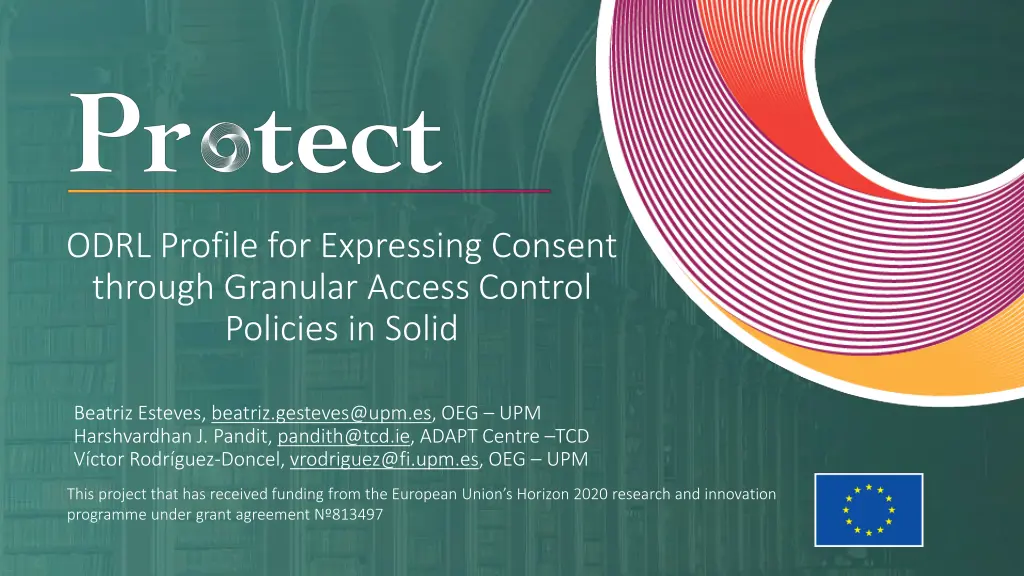
Granular Access Control in Solid
Explore the ODRL profile for expressing consent through granular access control policies in Solid. Learn about Solid's decentralized personal data stores, interoperable data formats, and protocols. Discover how Solid's ACL can be extended to specify and enforce individual data sharing preferences. Dive into related work on access control using Linked Data and specifying personal data processing. Understand the requisites for Solid's ACL and the use of ODRL to define "sticky policies" for data protection and privacy.
Download Presentation

Please find below an Image/Link to download the presentation.
The content on the website is provided AS IS for your information and personal use only. It may not be sold, licensed, or shared on other websites without obtaining consent from the author. If you encounter any issues during the download, it is possible that the publisher has removed the file from their server.
You are allowed to download the files provided on this website for personal or commercial use, subject to the condition that they are used lawfully. All files are the property of their respective owners.
The content on the website is provided AS IS for your information and personal use only. It may not be sold, licensed, or shared on other websites without obtaining consent from the author.
E N D
Presentation Transcript
ODRL Profile for Expressing Consent through Granular Access Control Policies in Solid Beatriz Esteves, beatriz.gesteves@upm.es, OEG UPM Harshvardhan J. Pandit, pandith@tcd.ie, ADAPT Centre TCD V ctor Rodr guez-Doncel, vrodriguez@fi.upm.es, OEG UPM This project that has received funding from the European Union s Horizon 2020 research and innovation programme under grant agreement N 813497
Overview Introduction to Solid Motivation Related Work ODRL Profile for Solid s ACL Implementation & Architecture Challenges Conclusion
Introduction to Solid Solid is a specification for decentralised personal data stores interoperable data formats and protocols. based on https://solidproject.org Solid s Access Control Authorizations Beatriz has full access to one of her web resources, located at https:// beatriz.databox.me/docs/file1 <#authorization1> a acl:Authorization; acl:agent <https://beatriz.databox.me/profile/card#me>; acl:accessTo <https://beatriz.databox.me/docs/file1>; acl:mode acl:Read, acl:Write, acl:Control. WebID Ownership Interoperability
Motivation Identity Purpose Personal data categories Processing categories Legal bases Recipients provide information regarding GDPR s Articles 13 and 14 Consent How can Solid s ACL be extended to specify and enforce an individual s data sharing preferences? Introspect use of personal data Store consent and authorisations Determine data sharing preferences
Related Work Access Control using Linked Data Specifying Personal Data and Processing
ODRL Profile for Solids ACL Requisites R1. Support specifying user preferences as policies. R2. Incorporate vocabulary specifying or aligned to legal concepts. R3. Support specifying permissions and prohibitions at arbitrary granularity. R4. Support identifying and resolving conflicts based on scope. R5. Record (store) policies used to authorise access. R6. Support querying policies and authorisations for introspection of data use. :example-1 a odrl:Policy ; odrl:permission [ odrl:assigner [ a oac:DataSubject ; cert:key "https://beatriz.webID/card#me" ] ; odrl:target oac:Contact ; odrl:action oac:Read ; odrl:constraint [ odrl:leftOperand oac:Purpose ; odrl:operator odrl:isA ; odrl:rightOperand dpv:AcademicResearch ] Extension of Solid's ACL mechanism using the ODRL specification to define "sticky policies" that express permissions and/or prohibitions associated with data stored in a Solid pod and uses DPV as a controlled vocabulary to invoke specific privacy and data protection terms. https://w3id.org/oac/ ] .
Implementation & Architecture Extension of the existing Solid Pod specification Consent datastore keep a record of the consent actions Audit Log store metadata related to logins, access requests, changes in policies and consent authorisations Notification Mechanism allow to update or revoke requests regarding consent Metadata and Policies Editors assist users to craft granular policies for the management of access to their Pod
Challenges Efficiency and performance Deal with large collection of policies in the form of preferences, authorisations requests, and Storage and Management of Policies Where to store requests and user policies Discovery of policies that refer to a given resource How to craft valid ODRL policies Complexity of ODRL policies The more data is transmitted in policies and requests, the more time and resource- consuming will be the authorization mechanism Deal with conflicting policies, i.e., global prohibitions outweigh local permissions Create a separate area of the Pod to store the policies and metadata declarations Create a Policies Editor component that supports users in drafting the policies, without having the need for previous ODRL knowledge Limit ODRL features to ensure optimal performance
Challenges Legal Implications of Requests Consent Deal with other legal bases, i.e., compliance with a legal obligation or legitimate interests To ensure that consent is informed and explicit, specific information items should be provided and recorded Allow users to update or revoke consent Discuss whether the implicit consent from the established user preferences is enough to provide automated access to non-sensitive personal data Discuss whether access to resources in the pod should be automated Challenge that is unlikely to be satisfactorily addressed Legal Interpretation of Request and Preferences Allow users to choose which data types, and purposes, they are enabling automation and which not Have a queryable Consent datastore which can be easily updated comfortable with Map policies, requests, and preferences with their legal interpretation Deal with different jurisdictions
Conclusion Solid s shortcomings Expression of more complex policies beyond a yes/no Alignment with GDPR requisites Future Work Implement reasoners that can efficiently perform the authorization decision. Define the RDF SHACL shapes that determine which ODRL expressions can be evaluated. Declare mappings to other languages that grant interoperability with compliance tools. Grant seamless operation with non-ODRL Solid Pods Can be overcome by the use of
ODRL Profile for Expressing Consent through Granular Access Control Policies in Solid Q & A Q & A Beatriz Esteves, beatriz.gesteves@upm.es, OEG UPM Harshvardhan J. Pandit, pandith@tcd.ie, ADAPT Centre TCD V ctor Rodr guez-Doncel, vrodriguez@fi.upm.es, OEG UPM This project that has received funding from the European Union s Horizon 2020 research and innovation programme under grant agreement N 813497
